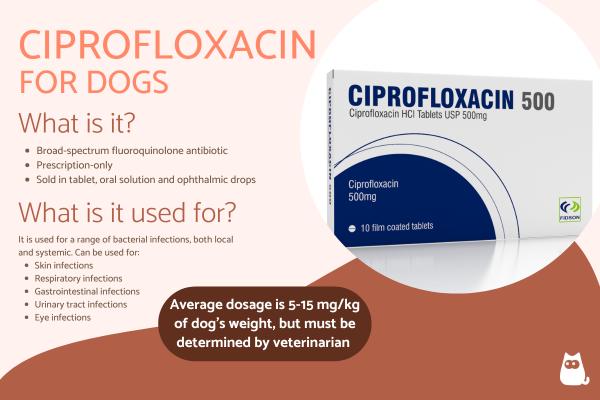
Ciprofloxacin is a type of fluoroquinolone antibiotic which is used as a broad-spectrum treatment for a range of bacterial infections. While it is not usually marketed directly for veterinary use, many veterinarians will administer ciprofloxacin for dogs in off-label prescriptions. The reason is it not as commonly used is the preference for other fluoroquinolone antibiotics which are marketed specifically for veterinary use. Enrofloxacin is much more commonly used than ciprofloxacin, the former being sold under the name Baytril. Despite the prevalence of enrofloxacin, there are circumstances when ciprofloxacin will be preferred by a veterinarian.
At AnimalWised, we explain ciprofloxacin for dogs uses, dosage and side effects. It is a drug which should only ever be administered under veterinary supervision. Do not give ciprofloxacin to your dog unless expressly permitted to do so by a professional.
What is ciprofloxacin for dogs?
Ciprofloxacin is an antibiotic belonging to the group of antibiotics known as fluoroquinolones. This is a group of broad-spectrum antibiotics which inhibit the enzymes essential for DNA replication in the bacteria. This means the bacteria cannot multiply and the infection is stopped.
Other fluoroquinolone antibiotics are more prevalent in veterinary medicine. Commonly sold under the trade name Baytril, enrofloxacin for dogs is both marketed specifically to dogs and more commonly prescribed by vets. This is partly because enrofloxacin is partially transformed into ciprofloxacin once metabolized, providing the same antibacterial effect in a safer way.
Preparations of ciprofloxacin for dogs
As we have stated, ciprofloxacin is not a drug which is marketed directly for veterinary use. This means there is no preparation specifically for dogs. When a drug is used off-label, it means a veterinarian prescribes a drug which is unapproved for a certain use or for a certain type of patient. This does not mean it is unsafe, but its safety and efficacy needs to be determined by a professional.
Ciprofloxacin for human use is sold under the following preparations:
- Tablets
- Oral solution
- Ear drops
- Eye drops
The most common form for veterinary use is undoubtedly the administration of the drug in tablets. These can easily be given to the dog with food.

Ciprofloxacin for dogs uses
Ciprofloxacin is used to treat bacterial infections, both local and systemic. This drug is usually prescribed for infections that are particularly deep and/or difficult to treat. For example, it may be used for infections caused by intracellular microorganisms.
Despite being a good broad-spectrum antibiotic, we must take into account that ciprofloxacin in dogs is not effective against all bacteria. It is always best to perform an antibiogram prior to treatment. Thanks to the antibiogram, we can know which bacteria are affecting the dog and to which antibiotics they are most sensitive.
The use of ciprofloxacin in dogs is recommended for several types of infection. They include the following:
- Skin infections: such as deep pyodermas or subcutaneous abscesses caused by bacteria sensitive to ciprofloxacin.
- Respiratory infections: pneumonia or bacterial bronchitis are usually treated with this type of antibiotic, sometimes combined with the use of bronchodilators.
- Intestinal infections: the use of ciprofloxacin for the treatment of digestive tract infections is recommended in certain cases, although it must be carefully controlled to avoid affecting the bacterial population that forms part of the intestinal flora. It is common to combine the use of antibiotics with that of probiotics. Discover what is a good probiotic for dogs in our related article.
- Urinary or reproductive system infections: some pathologies such as cystitis or prostatitis are relatively common in dogs. If complicated by a bacterial infection, they may require the use of ciprofloxacin to heal.
- Eye infections: ophthalmic drops can be used to treat certain eye infections in dogs.
- Ear infections: similar drops may be used to treat various forms of otitis in dogs.
Discover the most common eye infections in dogs with our related guide.
Ciprofloxacin for dogs usage
The dosage of ciprofloxacin for dogs will depend on the individual dog's clinical needs, being calculated by the severity of infection and the weight of the animal. While the veterinarian needs to determine the specific ciprofloxacin dose, the average recommendation is as follows:
- 5-15 mg/kg of dog's weight which is administered orally every 12 hours (i.e. twice a day).
After a thorough clinical examination of the animal, the veterinarian will be the one who decides the dose that your dog should take. They will also explain how often it should be administered and the total duration of the treatment. All this information must be clearly stated in the prescription given to the dog's guardian. Ciprofloxacin is not an over-the-counter drug and requires veterinary prescription before it can be purchased.
Ciprofloxacin for dogs side effects
Although this antibiotic is generally well tolerated by dogs, there is always a potential for adverse side effects. The most common include:
- Gastrointestinal disorders: the main signs of gastrointestinal side effects are vomiting and diarrhea. These signs are usually self-limiting and cease on their own without specific intervention. If they continue, worsen or other clinical signs develop, the drug administration should be stopped and replaced with another.
- Allergic reactions: these are very rare, but may occur if the animal is hypersensitive to ciprofloxacin and this information was unknown before starting treatment.
- Joint damage: administration of ciprofloxacin to developing puppies can cause joint damage leading to permanent lameness. The dose should be carefully controlled and its use should be avoided in puppies where possible.
- Neurological problems: although uncommon, some of the most serious side effects of ciprofloxacin for dogs can be of a neurological origin, resulting in tremors, disorientation, ataxia, dizziness or seizures. These require immediate veterinary intervention.
If you worry your dog may have impaired brain function, we share the symptoms of neurological disorders in dogs.

Contraindications of ciprofloxacin in dogs
As we have reinforced throughout this article, only a veterinary professional can prescribe ciprofloxacin for dogs. They will be the one who will determine its dosage and type of administration. They will also be able to assess whether the dog is a poor candidate for this drug. This will be due to one of the following contraindications which they will need to take into account:
- Puppies: ciprofloxacin administration should be avoided in immature dogs, i.e. those less than 12 months (small and medium breeds) or 18 months (large and giant breeds). This is due to the risk of joint malformation.
- Lactating females: since part of the drug is eliminated through breast milk, puppies can ingest the drug and experience the aforementioned side effects.
- Dogs taking certain other drugs: when ciprofloxacin is taken together with other drugs such as tetracyclines, phenicols or macrolides, dangerous antagonistic effects may occur.
- Dogs with central nervous system disorders: ciprofloxacin can worsen the symptoms or complicate the management of certain nervous disorders.
- Pregnant females: extreme caution should be exercised when administering ciprofloxacin to pregnant females or to patients with severe renal or hepatic insufficiency.
You can learn about another type of broad-spectrum antibiotic with ophthalmic use in animals with our article on tobramycin for dogs.
This article is purely informative. AnimalWised does not have the authority to prescribe any veterinary treatment or create a diagnosis. We invite you to take your pet to the veterinarian if they are suffering from any condition or pain.
If you want to read similar articles to Ciprofloxacin for Dogs Usage and Dosage, we recommend you visit our Medicine category.
- Medicines and Health Products, A. E. (n.d.) . CIMAVet : Veterinary medicines information center . Aemps.es.
https://cimavet.aemps.es/cimavet/publico/home.html - Regehr, T. (n.d.). MSD Veterinary Manual.
https://www.msdvetmanual.com/es - Spain, VV (n.d.). Search for ciprofloxacin. Vademecum.es.
https://www.vademecum.es/buscar?q=ciprofloxacino&cc=es